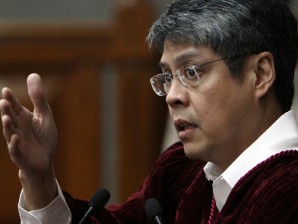Senator Francis Pangilinan on Monday said magistrates associated with impeached Chief Justice Renato Corona were blocking the reforms being implemented by Chief Justice Ma. Lourdes Sereno in the judiciary.
Pangilinan said this was evidenced by the strong opposition to Sereno’s move creating a regional office in Cebu City in a bid to decentralize the judiciary.
Although he did not name anyone, Pangilinan said he was referring to “those who were associated with him (Corona) and have continued to resist reforms.”
“We support Chief Justice Ma. Lourdes Sereno’s efforts at decentralization, which I believe is the issue behind the latest controversy regarding Administrative Order No. 175-2012, or the reopening of the Regional Court Administration Office (RCAO) in Cebu City in Region VII,” said Pangilinan on the eve of the Supreme Court en banc meeting where Sereno is expected to finally face her fellow justices who had questioned the RCAO project which was not approved by the high court en banc.
The RCAO project, funded by the Asian Development Bank, underwent pilot testing in 2006 but failed, prompting the high court to scrap it during the transition period between Chief Justices Reynato Puno and Corona.
Sereno, however, revived the project “on her own” and issued the AO establishing the RCAO in Cebu City even if the procedure stipulates that this should be approved by the high court en banc, a source said.
Associate Justice Teresita Leonardo-De Castro has written a letter to Sereno demanding a recall of her order because this was contrary to the results of the Nov. 27 en banc meeting where several justices opposed the move.
De Castro insisted that only the high court en banc and the Office of the Court Administrator (OCA) could rule on the reopening of the Cebu office. The OCA is headed by Midas Marquez who served as Corona’s spokesperson.
De Castro was among the magistrates who have been cool to Sereno, who include Associate Justices Antonio Carpio, Diosdado Peralta, Lucas Bersamin, Arturo Brion, Presbitero Velasco and Martin Villarama Jr. they have shown their displeasure at her appointment by snubbing the SC flag ceremony several times.
Welfare and benefits
In reviving the RCAO project, Sereno said RCAO Cebu would be for the welfare and benefit of judges in the Visayas who could now file leave applications and other benefits and process them there without having to go to the OCA office in Manila.
Sereno had also enumerated on the merits and desirability of having an RCAO in Cebu instead of having a centralized office.
Pangilinan agreed with Sereno, saying decentralization was the key to speeding up the resolution of court cases as mandated by the Constitution. “The concentration of powers in the national office has adversely affected the efficiency of our courts,” he said.
But Sereno’s fellow justices objected to the Chief Justice’s move to revive the RCAO, saying this should have been approved by the high court en banc and were about to question her decision in last week’s en banc session.
But Sereno called in sick and skipped the session, thus, averting a confrontation with her colleagues. She, however, attended the roundtable discussions of Asean chief justices on environmental law and enforcement in Malaysia.
Creation of regional courts
According to Pangilinan, Sereno’s move to decentralize the justice system was in keeping with the reforms initiated by former Chief Justices Hilario Davide Jr. and Puno who had also pushed for the creation of more regional courts to speed up the resolution of pending cases.
“It was former Chief Justice Renato Corona who suspended the decentralization of courts during his term. I cannot help but ask if this controversy stems from the OCA refusing to give up the powers it had enjoyed under former Chief Justice Renato Corona. Why was it right then and wrong now?” said Pangilinan.
Pangilinan said the high court’s operations had become too centralized that “even the purchase of certain supplies and materials for the regional trial courts all throughout the country needed approval in Manila.”
